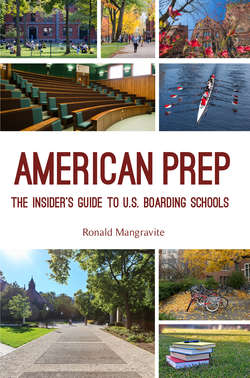Читать книгу American Prep - Ronald Mangravite - Страница 12
На сайте Литреса книга снята с продажи.
ОглавлениеBoarding schools can provide an outstanding “holistic” educational experience where learning extends well beyond classroom academics to sports, extracurricular activities, and dorm life. However, boarding schools are not for every student or every family situation. The pros and cons must be considered very carefully as a critical first step.
ARGUMENTS FOR BOARDING SCHOOL
Boarding schools have traditional strengths which have been augmented by several recent societal and educational trends.
ACADEMICS
Boarding school culture is strongly pro-education. Its elite status combined with extremely low admission rates result in a motivated majority of students focused on academic success. The quality of the faculty of the elite schools matches and often surpasses that of many colleges. The percentage of boarding school faculty with advanced degrees surpasses that of the faculties at private day and public schools.
Boarding school classes are small, teacher-student ratios are superior, and students receive strong academic support through numerous advisors and tutors. Opportunities for educational travel, research, and independent study are abundant. Boarding education is immersive, with discussions extending beyond the classroom to conversations at meals, in activity clubs, or in the dorms. Students with high academic expectations and strong work and life habits tend to positively influence those around them. Additionally, boarding school resources – superior libraries, laboratories, and arts and sports facilities – offer a cornucopia of opportunities that few day schools or publics can match.
NON COGNITIVE “SOFT” SKILLS (aka CHARACTER)
Away from daily parental control, students quickly learn responsibility and self-control. Adult authority is not commingled with parent/child emotional issues. Students learn to live in close social groups and obey firm community laws. Living with other students and faculty develops social and political skills – decision making, persuasion, negotiation, and accommodation (getting along with everyone). If they have not already, students must learn self-reliance. No one will clean their rooms for them, wake them up, handle their spending money accounts, buy their clothes, schedule haircuts, or find their lost items. The schools are highly competitive but also cooperative communities, where social ease and cooperation are paired with an expectation of excellence and hard work. Confronting and then recovering from failure is another prep skill. Boarding school students often find the transition to college life a minor shift.
Like the tiny irritants that create the pearl in the oyster (more circles and ovals), the small conflicts and competitions at boarding school are integral to the development of “character”, now termed “non-cognitive skills” or “soft skills”. In today’s test obsessed school environments, these traits are increasingly valuable. Paul Tough’s 2012 book How Children Succeed describes traits consistent with success in life – grit, self control, zest, social intelligence, gratitude, optimism, and curiosity – all traditional prep characteristics. In a 2015 survey by the Wall Street Journal of nearly 900 executives ”…92% said soft skills were equally important or more important than technical skills…but 89% said they have a very or somewhat difficult time finding people with the requisite attributes.” A LinkedIn analysis found “the ability to communicate trumped all else, followed by organization, capacity for teamwork, punctuality, critical thinking, social savvy, creativity and adaptability.”
PERSONAL SAFETY
Boarding students are shielded from certain hazards that public and day students may face in some regions. The no drive/no ride rules minimize the chances that boarding students will be involved in auto accidents, DUIs, or weekend escapades. The rules regarding off campus travel and dorm sign in/sign out, as well as 24 hour campus security and continuous adult supervision, provide more safety for students than they might have living back home.
SOCIAL BENEFITS
Boarding school communities are purposefully diverse with students drawn from every race, ethnicity, economic class, and geographical origin. Students tend to develop strong spoken and written communication skills, as well as heightened poise, assurance, and decisiveness.
Students develop strong bonds in their dorms or houses, in their sports teams, and across their boarding communities as they share their out-of-class lives together. The campus environment – competitive, high energy, group oriented – promotes personal poise, social and negotiation skills, loyalty, and confidence. The many clubs, sports teams, and service opportunities provide students with ample opportunities to discover their own strengths, talents, and interests.
COLLEGE COUNSELING
Boarding schools have developed college preparation into something approaching a science. 100% of prep school students are expected to go on to college; the focus on admissions issues is central, not a subject for a minority cohort as is the usual case in public schools. Students are trained in test taking, resume building, interviewing, and college search techniques. Since continued success in college placement is critical to the boarding school’s future recruiting (in fierce competition with rival schools), the school has a deep stake in each student’s admissions success.
ALUMNI CONNECTIONS
Boarding schools are noted for extensive well funded alumni associations, which serve as lifelong social clubs and business networking systems amongst alumni. The schools’ alumni offices produce elaborate alumni events and reunions throughout each academic year. Each graduating class maintains officers who maintain contact information and correspond with class members. As the years pass, alumni classmates often develop deeper friendships with each other and their families, maintaining enduring class and school communities rarely found among public and private day school alumni.
Alumni status also can assist the children of alumni who seek admissions to “their” schools. Alumni who provide financial support and volunteer service to their alma maters receive preferential treatment in admissions considerations and school faculty hiring.
